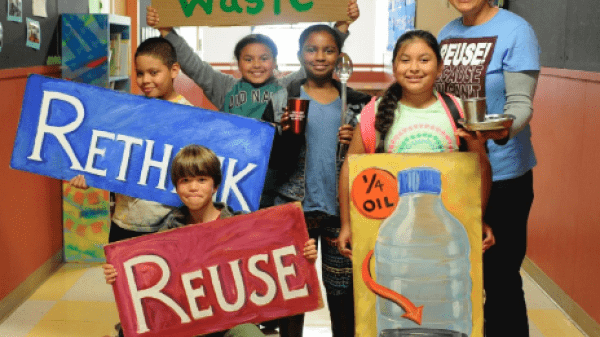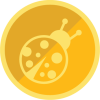Talking Trash with Jacqueline Omania

Last school year, before the words “global pandemic” were part of every conversation I had, I embarked on an ambitious and sadly ill-fated mission to eliminate landfill waste from my 1st grade classroom. Nowadays, I would give anything to just be able to teach in a real classroom again. However, I’m also trying to see this situation as a chance to start fresh, to reevaluate some of the practices that are so deeply ingrained in elementary school culture. The shiny new plastic-encased markers. The individual plastic-robed glue sticks. The squeezable tubes of yogurt. The list goes on.
Whenever I do get the opportunity to return to my classroom, I want to do things differently, and there’s no better person to talk to about my aspirations than Jacqueline Omania, the inspirational teacher behind the Zero Waste Classroom Project and winner of the 2019 Presidential Innovation Award for Environmental Educators.
What is a zero waste classroom?
- It tries to make no landfill trash.
- It tries not to use plastic-- we use real forks, spoons, and cups.
- It tries to recycle and compost.
- It practices rethinking, reusing, and refusing.
- It practices and studies about being a sustainable person.
Why do you make your classroom zero waste?
Once I got informed about plastic recycling not really happening, I didn't want to participate in that anymore. So I shared it with my kids.
Having done a zero waste classroom for the fifth year now- I feel it completely inspires all my students.
They can connect, they can make changes and see and measure it. They know the world has great challenges, but they are empowered daily with the desire to learn more and the ability to make a difference.
What have been the biggest challenges to going zero waste?
It’s not as much as you would expect. The trick is to get the kids onboard, to make it theirs. Make them feel like it’s reachable for them. It’s a matter of intention. You try to be intentional to make the least waste you can. It’s definitely a process--it took 5 years to get there.
My obstacles are things that come from school. For example, all our math [materials] come wrapped in plastic. I’m required for them to use whiteboard markers when I teach math.
What surprised you about this project?
In any moment it could be destroyed, but it wasn’t. The kids embraced it on a deeper level, naturally, without a lot of force. They all wanted to do this, to do their part. Kids feel so powerless in the world. For them to know there’s a concrete way they can make a difference. [that] what they’re doing is worthy [and[ they have a role in the world--they really want that. They’re so proud, so bold. They impress me so much.
What kinds of impacts or changes have you seen in your students since starting this project?
They’re more engaged with their writing in general. They’re often writing their speeches [for press conferences]. They’re engaged because they know it’s going to have a purpose. With math, they’re doing multiplication and division for each trash audit. They’re super engaged with their learning.
I’ve had really positive feedback from parents. [They’re] so proud of their children for being advocates for the environment.
We’re stronger as a community together. This had a ripple effect around our school. I opened up the Ocean Club for the whole school--all their friends came. The other kids wanted to know about it and talk about it. Now we have 45 kids coming.
Where do you go from here?
My vision would be to empower every kid to get on board. If you set up everything with a Kindergarten cohort on board, you’re set.
More teachers need to be doing this, but we need the education piece for people to care. I’m hoping to create staff developments about this in a different way. Not telling teachers what to do, but showing them what we do.
It’s more than the materials--it’s parent education. More education to not buy those school supplies. They don’t need their own stuff. I think we all just need to share more. We’re constantly buying and dumping. We have so much excess, and we just need to redistribute all that. We have to rethink the way we are together, and the amount of stuff we have.
Learn more about the Zero Waste Classroom Project with these videos:
Trash Tales https://www.youtube.com/watch?v=FPctIgZ3eYM
Trash Tales Results https://www.youtube.com/watch?v=rWykO9lBnNM
Little Voices for Big Change in Berkeley https://www.upstreamsolutions.org/videos/little-voices-for-big-change-in-berkeley
